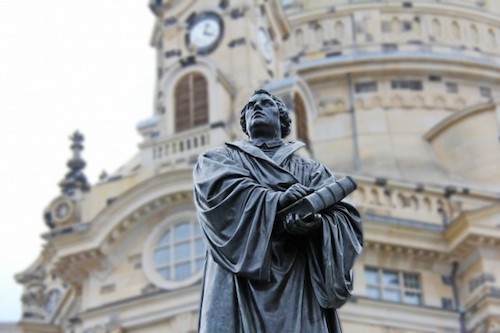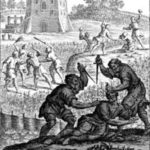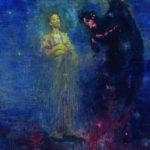We run our website the way we wished the whole internet worked: we provide high quality original content with no ads. We are funded solely by your direct support. Please consider supporting this project.

The Reformers and the Centrality of Christ
The Christocentric nature of the Church’s hermeneutic approached a zenith in the Protestant Reformation. While Luther and Calvin rejected allegorical interpretation, in theory if not in practice, they nevertheless relied on typology and other creative hermeneutical strategies to discern how Christ was the subject matter of the OT.
For Luther, Jesus was “the Word” in the most fundamental sense of the term, while the Bible was “the Word” in the derivative sense that it bore witness to him. In his famous preface to James, Luther went so far as to claim that the “proper touchstone for judging all books” is the extent to which they proclaim Christ. “Since all Scripture witnesses to Christ (Rom. 3:22ff),” and since “Paul is determined not to know anything save Christ (I Cor 2:2),” it followed for Luther that any book “that does not teach Christ is not yet apostolic, even though St. Peter or St. Paul does the teaching.”[1]
On this basis, Luther infamously concluded that the book of James was “an epistle of straw” in the original 1522 version of this preface. Reiterating the same point, a common refrain running throughout Luther’s writing is that, when properly interpreted—viz. with the eyes of faith and in light of Christ— one can discern not only that all Scripture is about Christ, but that it is about Christ alone. “The entire Old Testament refers to Christ,” he proclaims.[2] “Take Christ out of the Scriptures,” Luther rhetorically wonders, “and what else will you find in them?”[3] Similarly, it is for Luther “beyond question that all the Scriptures point to Christ alone.”[4] Like a letter a man first closed but then “afterwards broke it open,” so too, Luther says, “the Old Testament is an epistle of Christ, which after His death He opened and caused to be read through the Gospel and proclaimed everywhere.”[5]
Likening Scripture to the cloth the baby Jesus was wrapped in, Luther at one point states that “[t]he law and the prophets are not rightly preached or known save we see Christ wrapped up in them.”[6] Indeed, “when viewed aright,” he states, “all stories in Holy Scripture refer to Christ.”[7] His most powerful Christocentric statement, reflecting Paul’s profession to know nothing except Christ crucified, is found when Luther boldly proclaims: “I see nothing in Scripture except Christ Crucified.”[8]
Though he is certainly less rhetorical than Luther on the topic, Calvin also strongly affirmed a Christocentric hermeneutic. Commenting on John 5:39, for example, Calvin states: “We ought to read the Scriptures with the express design of finding Christ in them,” he asserts.[9] So too, the one thing “we should…seek in the whole of Scripture,” Calvin avers, is “truly to know Jesus Christ.”[10]
The Reformers clearly confessed that in Christ we find the foundational unity of both Testaments, for both are portraits of Christ, the only difference being in “the manner of painting.”[11]
[1] “Preface to James”, Luther’s Works, Vol. 35, Word and Sacrament, ed. E. T. Bachmann (Philadelphia: Muhlenberg Press, 1960), 396.
[2] WA 11.223.
[3] WA 18.606.
[4] WA 10.576.
[5] WA 10:11.181.
[6] Sermon on Luke 2:1-2, WA 10.11.80.
[7] WA, 4.153.
[8] WA 4.153.
[9] Calvin, Commentary on the Harmony of the Evangelists, tran. W. Pringle (Grand Rapids: Baker, 1979), 219 (see fn. 141)
[10] Preface to French translation of the NT, cited in Greidanus, Preaching Christ, 141.
[11] Calvin. Commentary on the Epistle of Paul the Apostle to The Hebrews , tran. J. Owen (Grand Rapids, MI: Baker, 1979), 222. See S. Edmondson, Calvin’s Christology (Cambridge: Cambridge University Press, 2004), 168–81 and E. J. Alexander, “The Supremacy of Jesus Christ,” in John Calvin: A Heart for Devotion, Doctrine, and Doxology (ed. Burk Parsons; Orlando: Reformation Trust, 2008), 109. Barth notes that, in contrast to the liberal theologies of Ritschl and Schleiermacher, Luther and Calvin didn’t have to try to be “Christocentric,” for their theologies were grounded in Christology from the outset, which, Barth rightly contends, is the only way a theology can be truly Christocentric. CD I/2:350–51
Photo via VisualHunt.com
Category: General
Tags: Christocentrism, Cruciform Theology, John Calvin, Martin Luther
Related Reading

Podcast: If the Cross is the FULL Revelation of God, Why Do We Even Need All the Rest?
Greg discusses the summation of the Bible in the crucifixion. http://traffic.libsyn.com/askgregboyd/Episode_0285.mp3

Podcast: Does a Jesus-Centric Theology Reduce God?
Greg challenges the traditional starting point of many theologies and defends starting our theology about God’s nature and character with what has been revealed about Jesus. http://traffic.libsyn.com/askgregboyd/Episode_0325.mp3

The Violent Vineyard Owner: A Response to Paul Copan (#8)
In my previous post I addressed two of the three parables that Paul Copan argues present God in violent ways. Today I will address the third, which is the parable of a vineyard owner with hostile tenants (Matthew 21:33-41; Luke 20:9-13). This parable differs from the previous two parables. Whereas the previous parables deal with…

Quotes to Chew On: Conflicting Depictions of God
“This is something like the way I believe we should respond when we encounter biblical narratives that depict God doing things we can’t imagine Christ doing. For example, I can’t for a moment imagine Jesus—the one who made refusing violence and loving enemies a condition for being considered a child of God—commanding anyone to mercilessly…

Atonement: What is the Christus Victor View?
Most western Christians today understand the atonement as a sort of legal-transaction that took place between the Father and the Son that got humanity “off the hook.” The legal-transaction scenario goes something like this: God’s holiness demands that all sin be punished, which in turn requires that sinners go to eternal hell. The trouble is,…

The Twist that Reframes the Whole Story
Many people read the Bible as if everything written within it is equally authoritative. As a result, people read it along the lines of a cookbook. Like a recipe, the meaning and authority of a passage aren’t much affected by where the passage is located within the overall book. The truth, however, is that the…
